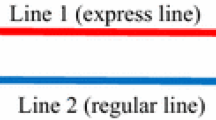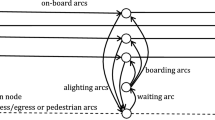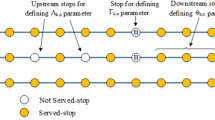Abstract
Transit assignment models represent the stochastic nature of waiting times, but usually adopt a deterministic representation route flows and costs. Especially in cities where transit vehicles are small and not operating to timetables, there is a need to represent the variability in flows and costs to enable planners make more informed decisions. Stochastic process (SP) models consider the day-to-day dynamics of the transit demand-supply system, explicitly modelling passengers’ information acquisition and decision processes. A Monte Carlo simulation based SP model that includes strict capacity constraints is presented in this paper. It uses micro-simulation to constrain passenger flows to capacities and obtain realistic cost estimates. Applications of the model and its comparison with the De Cea and Fernandez (Transp Sci, 27:133–147, 1993) model are presented using a small network.
Similar content being viewed by others
References
Cantarella GE, Cascetta E (1995) Dynamic processes and equilibrium in transportation networks: towards a unifying theory. Transp Sci 29:305–329
Cascetta E (1989) A stochastic process approach to the analysis of temporal dynamics in transportation networks. Transp Res Part B 23:1–17
Cepeda M, Cominetti R, Florian M (2006) A frequency based assignment model for congested transit networks with strict capacity constraints: characterization and computation of equilibria. Transp Res Part B 40:437–459
Cominetti R, Correa J (2001) Common lines and passenger assignment in congested transit networks. Transp Sci 35:250–267
Davis GA, Nihan NL (1993) Large population approximations of a general stochastic traffic assignment model. Oper Res 41:169–178
De Cea J, Bunster JP, Zubieta L, Florian M (1988) Optimal strategies and optimal routes in public transit assignment models: an empirical comparison. Traffic Eng Control 49:520–526
De Cea J, Fernandez E (1993) Transit assignment for congestion public transport networks: an equilibrium model. Transp Sci 27:133–147
Hamdouch Y, Marcotte P, Nguyen S (2004) Capacitated transit assignment with loading priorities. Math Program B 101:205–230
Hazelton M, Watling D (2004) Computation of equilibrium distributions of Markov traffic assignment models. Transp Sci 38:331–342
Kurauchi F, Bell MGH, Schmöcker J-D (2003) capacity constrained transit assignment with common lines. J Math Model Algorithms 2:309–327
Nguyen S, Pallottino S (1988) Equilibrium traffic assignment for large scale transit networks. Eur J Oper Res 37:176–186
Sheffi Y (1985) Urban transportation networks: equilibrium analysis with mathematical programming methods. Prentice Hall, Englewood Cliffs
Smith MJ (1984) The stability of a dynamic model of traffic assignment: an application of a method of Lyapunov. Transp Sci 18:245–252
Spiess H, Florian M (1989) Optimal strategies: a new assignment model for transit networks. Transp Res Part B 23:83–102
Watling D (1996) Asymmetric problems and stochastic process models of traffic assignment. Transp Res Part B 30:339–357
Wu JH, Florian M, Marcotte P (1994) Transit equilibrium assignment: a model and solution algorithms. Transp Sci 28:193–203
Author information
Authors and Affiliations
Corresponding author
Rights and permissions
About this article
Cite this article
Teklu, F. A Stochastic Process Approach for Frequency-based Transit Assignment with Strict Capacity Constraints. Netw Spat Econ 8, 225–240 (2008). https://doi.org/10.1007/s11067-007-9046-3
Published:
Issue Date:
DOI: https://doi.org/10.1007/s11067-007-9046-3




